At Mountainside, we strive to help our clients live a happy and healthy life free from addiction. Our compassionate team of addiction treatment experts provides each client with the tools and empowerment they need to achieve long-term sobriety. While clients are in our care, they are given the direction and support to build the foundation needed to thrive after they leave our campus. This includes providing education on how to restore physical and mental health, strengthen interpersonal relationships, and cultivate the passion and skills to engage in activities that spark joy.
The foundation required for leading a full, happy life in recovery starts by addressing five major health indicators: depression symptoms, anxiety symptoms, substance cravings, attention deficit, and sleep difficulty. Mountainside Alumni Survey data confirms that improvements in the five major health indicators throughout treatment have a direct impact on the quality of life in long-term recovery. In fact, over 96 percent of alumni said that they are indeed happier after experiencing treatment at Mountainside. They also reported an 87 percent improvement in overall quality of life post treatment.
Mountainside’s Alumni Survey also asks former clients whether they noticed changes specifically in their physical and mental health, their interpersonal relationships, and their personal endeavors. In a recent alumni survey, responses with regard to these points were downright inspiring.
Health
Physical Health
Substance use can have many lasting and negative health effects. While these effects vary depending on the type of drug used among other factors, common side effects can include weight gain or weight loss, low energy, and the development of irregular eating and sleeping patterns.
Through improved nutrition, exercise, and sleep hygiene, clients regain their vitality and begin to undo the physical damage and patterns caused by active addiction. During treatment, Mountainside’s onsite chef considers the nutritional needs of each individual client to ensure a well-balanced diet. Physical activities such as yoga, hiking, and adventure therapy are also incorporated into clients’ routines to help them regain strength and energy as well as boost overall well-being.
Following treatment, clients understand the importance of healthy eating habits and exercise, and most incorporate them into their day-to-day life. Of the alumni we surveyed:
- Over 80 percent have improved physical health
- Many alumni continue to regularly practice the physical wellness activities they engaged in during treatment, including exercise (72 percent), hikes (42 percent), and yoga (29 percent)
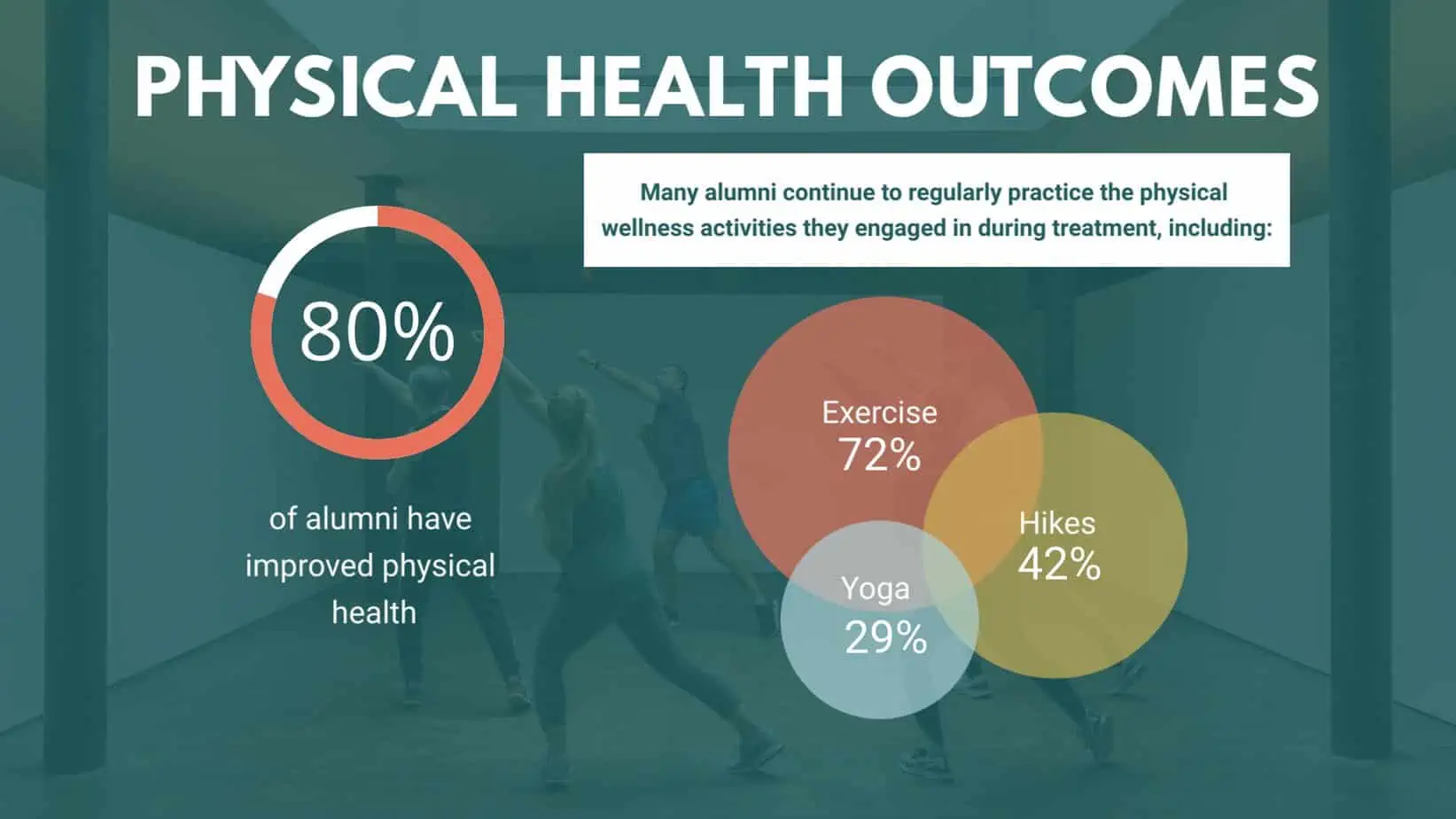
Mental Health
Alcohol and drug abuse often take a tremendous toll on one’s mental state, and many individuals struggle with issues such as depression and anxiety in tandem with their substance use disorder (SUD). Any co-occurring disorders are addressed immediately and integrated into a client’s treatment plan during their stay.
Our holistic approach to healing combines clinical and wellness practices that touch on all aspects of mental health. During treatment, Mountainside clients meet regularly with our clinical team to begin healing from the adverse mental health effects of their substance use through weekly individual and group counseling sessions. They also participate in a wide range of evidence-based, alternative treatments and activities, such as acupuncture, meditation, and art therapy. Of the alumni we surveyed:
- 87 percent have an increased ability to cope with stress
- Many alumni continue to practice the wellness activities they engaged in during treatment, and 82 percent report that they practice more than one wellness activity including meditation (52 percent) and journaling (29 percent)
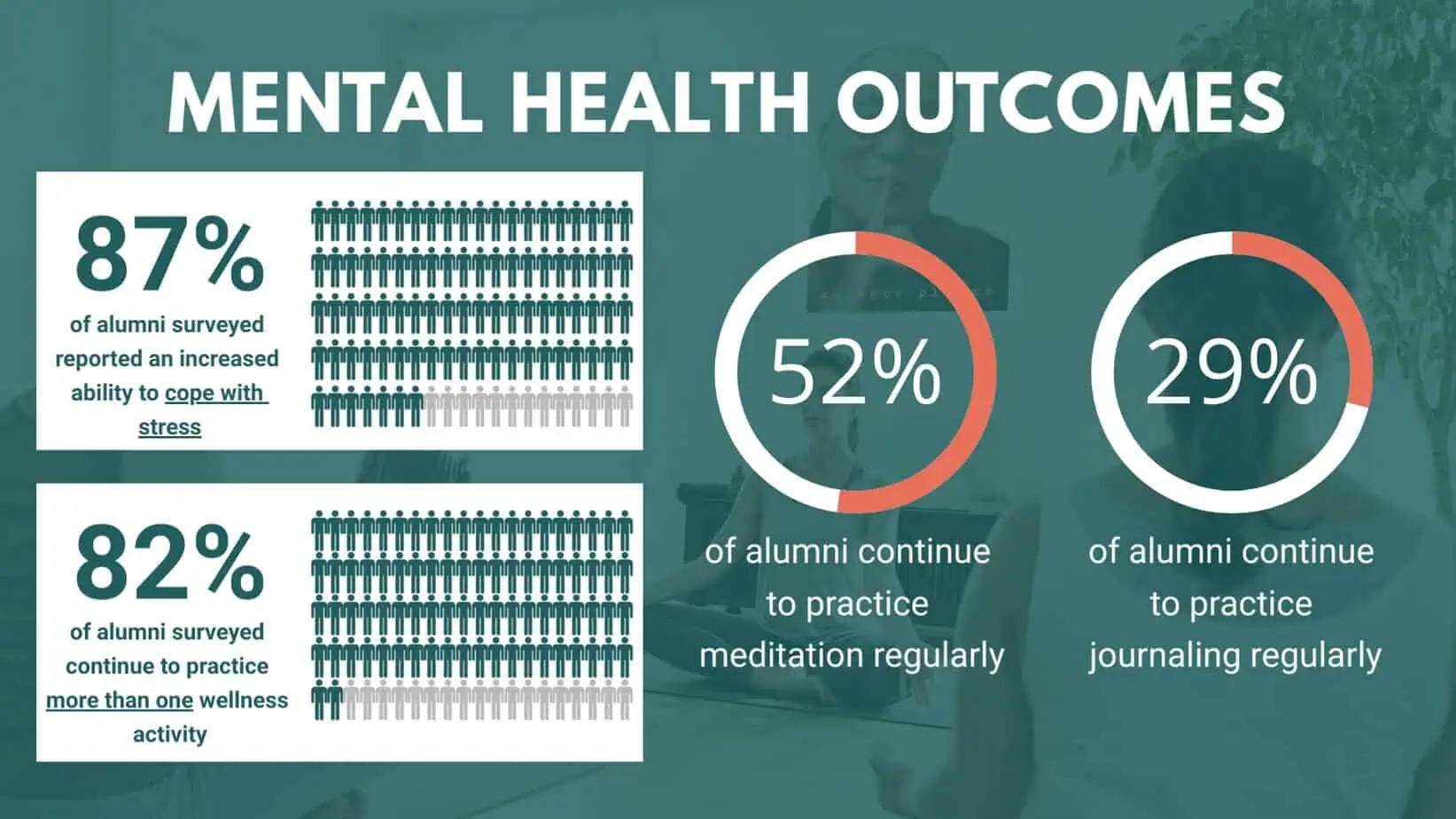
Interpersonal Relationships
Family Relationships
Addiction is an all-consuming disease. It is common for individuals struggling with addiction to neglect not only their own health, but their relationships with loved ones as well. Individuals with SUDs often inadvertently hurt the people closest to them, whether that is through physical and verbal aggression, stealing, breaking their trust, or simply neglecting quality time and household responsibilities.
A strong support network is the cornerstone of long-term recovery, and rebuilding trust and forgiveness with loved ones is an important step toward healing and growth for all involved. Through family counseling and educational groups, clients learn how to mend bonds with family that may have been compromised during active addiction. Mountainside alumni reported the following regarding their familial relationships:
- 81 percent have improved family relationships
- 88 percent say that their family is part of their support system
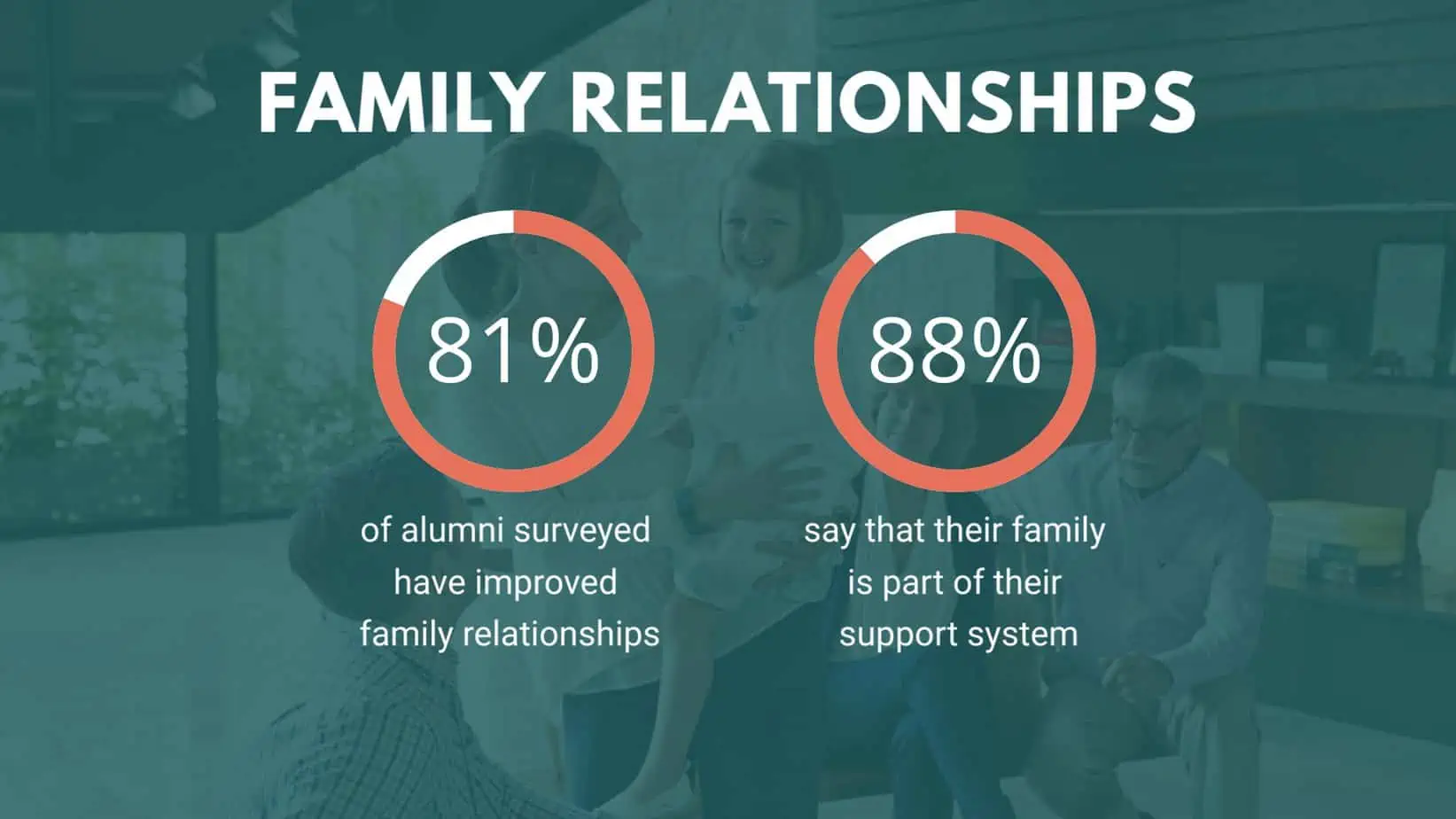
Peer Connections
Addiction also has an impact on peer relationships. Individuals with SUDs are often so focused on using that they self-isolate and withdraw from social gatherings and activities they once enjoyed.
While in our care, clients re-learn the value of making connections and building a strong support network. By forming healthy relationships with other like-minded individuals, clients have a support system in place to help them through obstacles they face in recovery and therefore lower the risk of relapse. Of the Mountainside alumni surveyed:
- 56 percent regularly attend support groups
- Of the alumni who attend support groups, 87 percent attend support groups at least once a week
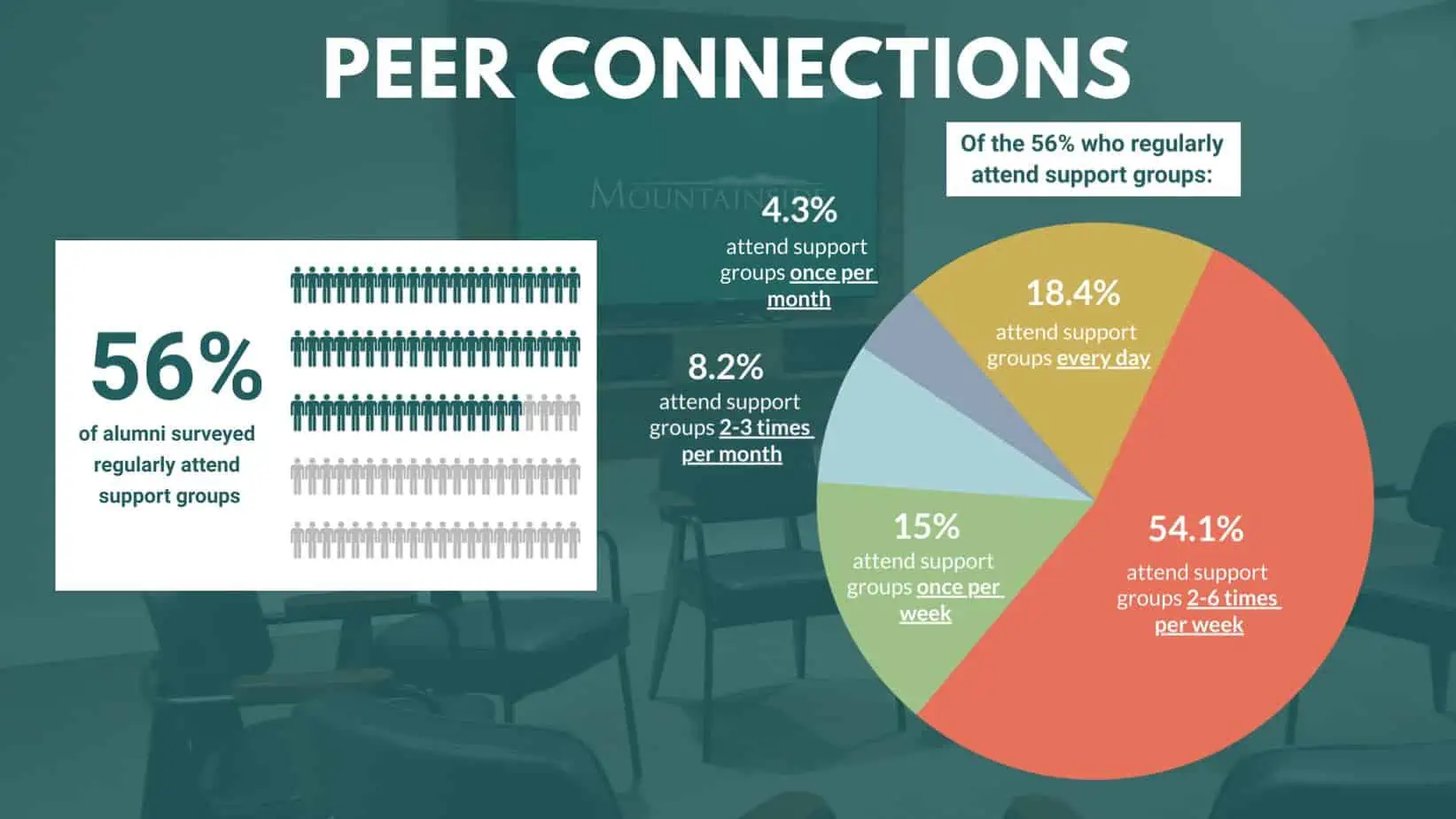
School and Work
When an individual becomes dependent on drugs or alcohol, it is likely that they will begin to neglect academic or professional responsibilities. Commitments to school or work become overwhelming, as most of their energy is focused on substance use. According to the Substance Abuse and Mental Health Services Administration (SAMHSA), employment is one of the top predictors of success for those in recovery. Potential benefits of holding a job while in recovery include lower rates of recurrence and easier transition from treatment to everyday life.
In our care, clients build the confidence to believe that they can be successful in achieving their dreams. Through counseling, wellness practices, and opportunities to connect with other like-minded individuals, clients re-learn to be present and gain a sense of hope and purpose, which they channel into their professional pursuits post-treatment. Of the alumni we surveyed:
- 80 percent are employed or are in school
- 70 percent say that they are more engaged in their career, job, or schooling

The Bottom Line: Happiness
Getting treatment at Mountainside provides the building blocks for a rewarding life in recovery. We offer the highest quality of care and compassion to help those struggling with substance use disorders to restore their physical and mental health, create sincere relationships, be engaged in their professional and personal endeavors, and live up to their full potential.
Our final series of questions asked alumni about their overall happiness and well-being. Since attending Mountainside, our alumni recently reported the following:
- 95 percent are now more grateful
- 94 percent are currently maintaining sobriety
- 94 percent feel hopeful about their future
- 91 percent now experience a greater sense of achievement and personal success
- 90 percent are now more self-aware of their ideas, thoughts, and feelings
- 89 percent now feel a greater sense of purpose in life
- 78 percent feel more self sufficient
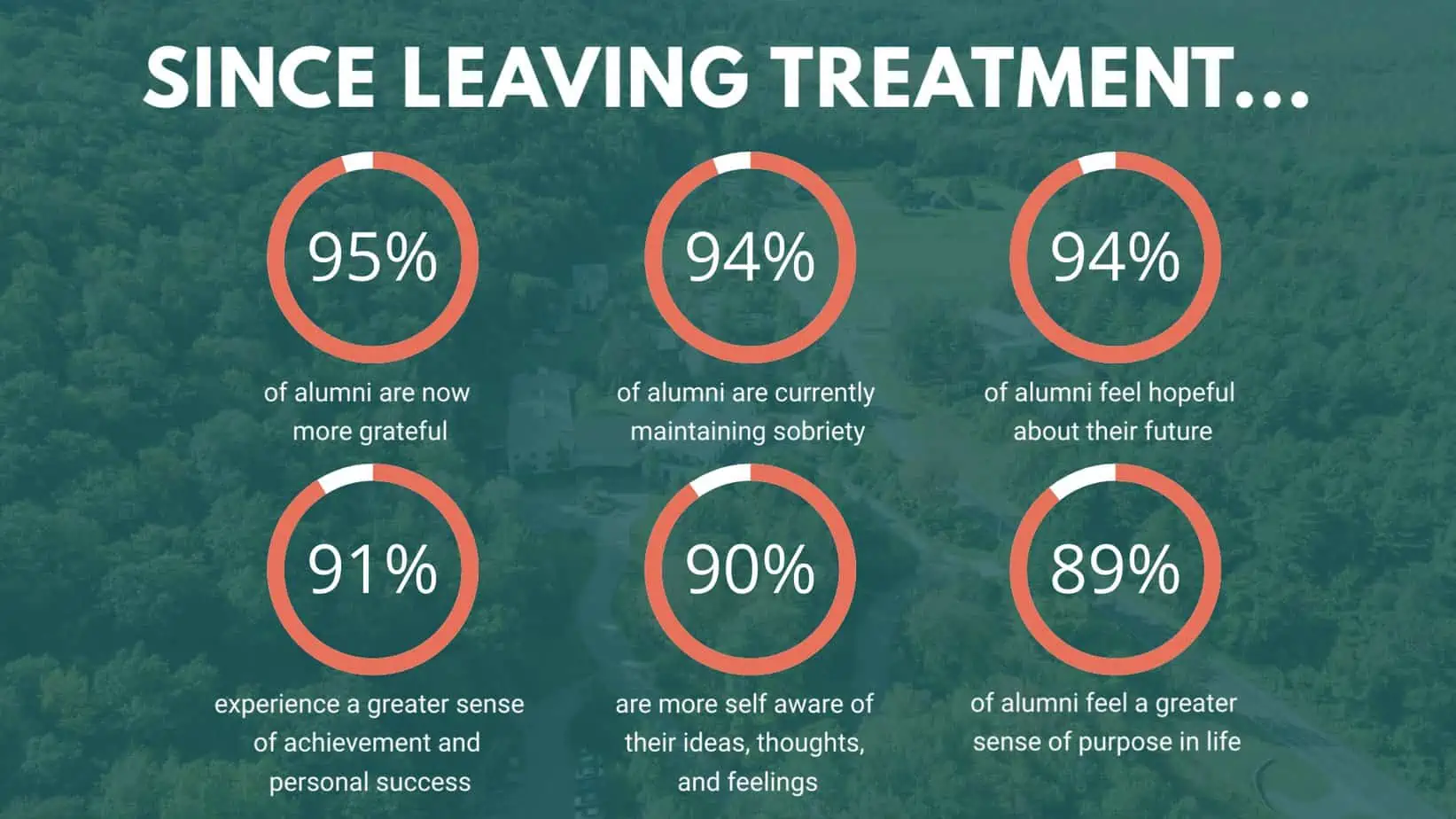
These outcomes don’t happen overnight or by coincidence. Clients commit to their progress during their stay at Mountainside and continue to implement what they have learned after treatment. Recovery is a long and difficult journey, but with dedication and support, a happy, sober life is possible. Rather than focusing solely on addiction, our holistic approach to healing addresses mind, body, and spirit – allowing our clients to leave treatment with newfound skills to achieve self-sufficiency, fulfillment, and happiness.
__
*All data gathered from 2023 Mountainside Alumni Surveys and reviewed/verified by a third-party analyst.



